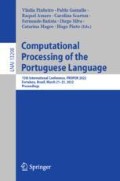Abstract
This work presents a new database containing high sampling rate recordings of a single male speaker reading sentences in Brazilian Portuguese with neutral voice, along with the corresponding text corpus. Intended for synthesis and other speech-oriented applications, the dataset contains text scripts extracted from a popular Brazilian news TV program, read out loud by a trained individual in a controlled environment, resulting in roughly 20 h of audio data. The text was normalized in the recording process and special textual occurrences (e.g. acronyms, numbers, foreign names etc.) were replaced by their phonetic translation to a readable text in Portuguese. There are no noticeable accidental sounds and background noise has been kept to a minimum in all audio samples. To illustrate the potential benefits of having this data available, text-to-speech experiments were conducted using state-of-the-art models for speech synthesis (Tacotron 2 and Waveglow). As a result, we obtained intelligible and natural sounding voices from as few as 8 min of audio samples coming from an unseen target speaker, after having trained over our data; moreover, by increasing the target recording time to 75 min, we have noticeably improved accuracy in pronunciation.
Access this chapter
Tax calculation will be finalised at checkout
Purchases are for personal use only
Notes
- 1.
Available from https://igormq.github.io/datasets/.
- 2.
A new transcript of the sentences read, including punctuation and graphic accentuation, is available from www.smt.ufrj.br/gpa/propor2022/.
- 3.
References
The LJ Speech Dataset. https://keithito.com/LJ-Speech-Dataset/. Accessed 23 Oct 2021
Panayotov, V., Chen, G., Povey, D., Khudanpur, S.: LibriSpeech: an ASR corpus based on public domain audio books. In: 2015 International Conference on Acoustics, Speech and Signal Processing (ICASSP), South Brisbane, Australia, pp. 5206–5210. IEEE (2015)
Barker, J., Watanabe, S., Vincent, E., Trmal, J.: The fifth ‘CHiME’ speech separation and recognition challenge: dataset, task and baselines. In: 19th Annual Conference of the International Speech Communication Association (Interspeech 2018), Hyderabad, India, pp. 1561–1565. ISCA (2018)
Ardila, R., et al.: Common voice: a massively-multilingual speech corpus. In: 12th Conference on Language Resources and Evaluation (LREC 2020), Marseille, France, pp. 4211–4215. ELRA (2020)
VoxForge. http://www.voxforge.org/home. Accessed 23 Oct 2021
Pratap, V., Xu, Q., Sriram, A., Synnaeve, G., Collobert, R.: MLS: a large-scale multilingual dataset for speech research. In: 21st Annual Conference of the International Speech Communication Association (Interspeech 2020), Shangai, China, pp. 2757–2761. ISCA (2020)
Salesky, E., et al.: The multilingual TEDx corpus for speech recognition and translation. In: 22nd Annual Conference of the International Speech Communication Association (Interspeech 2021), Brno, Czech Republic, pp. 3655–3659. ISCA (2021)
TED. https://www.ted.com/. Accessed 23 Oct 2021
Alencar, V., Alcaim, A.: LSF and LPC - derived features for large vocabulary distributed continuous speech recognition in Brazilian Portuguese. In: Asilomar Conference on Signals, Systems and Computers, California, U.S.A., pp. 1237–1241. IEEE (2008)
Casanova, E., et al.: TTS-Portuguese corpus: a corpus for speech synthesis in Brazilian Portuguese. arXiv preprint https://arxiv.org/abs/2005.05144
Python Programming Language. https://www.python.org/. Accessed 23 Oct 2021
Selenium Framework. https://www.selenium.dev/. Accessed 23 Oct 2021
Jornal Nacional Website. https://g1.globo.com/jornal-nacional/. Accessed 23 Oct 2021
Neumann TLM 102 Microphone. https://www.neumann.com/homestudio/en/tlm-102. Accessed 23 Oct 2021
Apogee Duet Interface. https://www.apogeedigital.com/products/duet. Accessed 23 Oct 2021
Audacity Software. https://www.audacityteam.org/. Accessed 23 Oct 2021
Sox Software. http://sox.sourceforge.net/. Accessed 25 Oct 2021
Shen, J., et al.: Natural TTS synthesis by conditioning WaveNet on MEL spectrogram predictions. In: 2018 IEEE International Conference on Acoustics, Speech and Signal Processing (ICASSP), Calgary, AB, Canada, pp. 4779–4783. IEEE (2018)
Prenger, R.J., Valle, R., Catanzaro, B.: WaveGlow: a flow-based generative network for speech synthesis. In: 2019 IEEE International Conference on Acoustics, Speech and Signal Processing (ICASSP), Brighton, UK, pp. 3617–3621 (2019)
Acknowledgment
This work is partially funded by the National Council for Scientific and Technological Development – CNPq.
Author information
Authors and Affiliations
Corresponding author
Editor information
Editors and Affiliations
Rights and permissions
Copyright information
© 2022 Springer Nature Switzerland AG
About this paper
Cite this paper
Leite, P.H.L., Hoyle, E., Antelo, Á., Kruszielski, L.F., Biscainho, L.W.P. (2022). A Corpus of Neutral Voice Speech in Brazilian Portuguese. In: Pinheiro, V., et al. Computational Processing of the Portuguese Language. PROPOR 2022. Lecture Notes in Computer Science(), vol 13208. Springer, Cham. https://doi.org/10.1007/978-3-030-98305-5_32
Download citation
DOI: https://doi.org/10.1007/978-3-030-98305-5_32
Published:
Publisher Name: Springer, Cham
Print ISBN: 978-3-030-98304-8
Online ISBN: 978-3-030-98305-5
eBook Packages: Computer ScienceComputer Science (R0)

